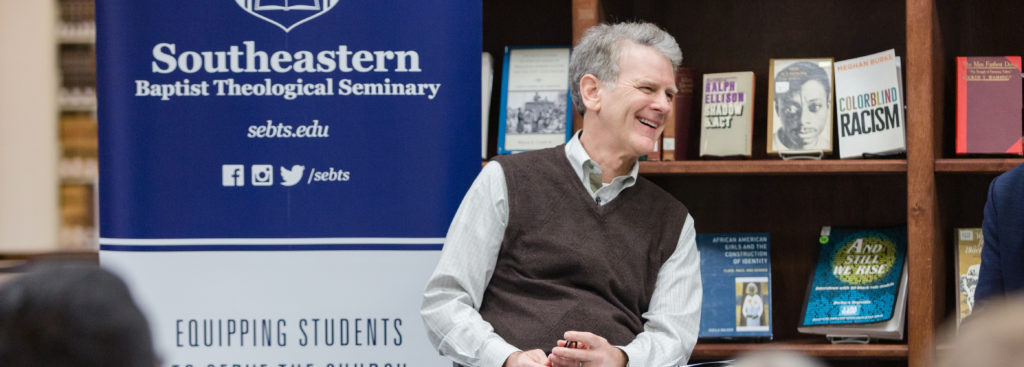Bryan Chapell highlights significance of Christocentric preaching during Adams Lecture Series
Lauren Pratt | February 19, 2019

During the three-day Adams Lecture Series, taught by Bryan Chapell Feb. 12-14, the explanation and purpose of Christ-centered exposition remained the focal point at Southeastern Baptist Theological Seminary (SEBTS). Chapell is senior pastor of Grace Presbyterian Church in Peoria, Illinois and president emeritus of Covenant Theological Seminary in St. Louis, Missouri.
In defining what it means to have a Christocentric hermeneutic, Chapell said, “It’s saying, ‘How is the Lord unfolding the gospel message throughout Scripture in a way that culminates in Christ?’”
In Tuesday’s chapel lecture, Chapell discussed the nature of Christocentric preaching in his lecture titled, “The Perspective of Christ-Centered Preaching,” in which he explained how pastors can see the redemptive Bible narrative through the lens of the gospel, noting that is a perspective that breeds compassion and grace for a congregation.
“That Bible is not just full of the sanitized heroes to be like,” said Chapell. “In fact, what the Bible is saying over and over again in a thousand ways is if God could use and bless people as messed up as those in the Bible, maybe there’s still hope for us,” he said, explaining how before he understood the Bible through a Christocentric lens, he lacked compassion and empathy for his hurting congregation who was facing job losses, depression and addiction due to a crisis in the town’s coal mining industry.
Chapel explained that pastors unintentionally create human-centered exposition when they focus their sermons on what he calls the “deadly be’s” that are so common to our preaching.” These included sermons that focus on being like a character in the Bible, being good and being disciplined.
“It is not wrong in itself; it is wrong by itself,” Chapell said of these methods of preaching.
During Wednesday’s library talk, Chapell discussed the importance of the Christ-centered hermeneutic, which involved a discussion of topics such as the definition of Christ-centered preaching, history context of biblical interpretation and the Christocentric/Christotelic debate.
Using the example of Genesis 28, Chapell explained how one could go about exegeting the text from a Christocentric approach using literary, historical and theological contexts. Chapell explained that what this text says is that God “is providing what you cannot provide for yourself.”
Chapell noted the miraculous work of how the Bible tells a consistent narrative throughout hundreds of years and by multiple authors.
“The Bible is a supernatural miracle in our laps every day,” said Chapell.
A Ph.D. colloquium lunch followed the library talk, where Chapell discussed with students the generational divide among evangelicals. He noted that the 50 and older group’s mission for the church was to win elections in seeking to be the moral majority in America while those 40 and younger desire to win a hearing with their lost neighbors. Due to this difference, generations can be at great odds with one another over how the Bible speaks to the issues faced in culture.
“What will unite us?” asked Chapell. “First, actually believing that we are trying to be biblical, though from different generations [and] believing that being made in the image of God is not just something to be directed to people outside the church, but [inside the church].”
Secondly, “this Great Commission is about the grace of God that is for all people,” he said, noting that in humility believers must seek unity by trying to understand one another.
In Thursday’s chapel lecture, Chapell discussed the reason for Christocentric preaching in his lecture titled, “The Power of Christ-centered Preaching.” He explained that preaching through this lens means that pastors must help congregants see their identity in Christ as what compels their obedience.
“Holy and acceptable are not statements of what you will become,” said Chapell, referencing Romans 12:1. “They are declarations of what you are.”
The source of power in the Christian life, Chapell said, comes from understanding that the Christocentric narrative of the Bible magnifies God’s love for believers through the gospel. This growing knowledge of God and his story should develop a great love for him.
“My job is to enable God’s people when I preach to love Christ more,” said Chapell.
Chapell’s teaching and preaching can be found at www.unlimitedgrace.com. He has also authored a number of books, including a preaching textbook titled “Christ-Centered Preaching.” He and his wife, Kathy, have four adult children and multiple grandchildren.
To view the Adams Lecture Series 2019 chapel sermons, visit multimedia.sebts.edu/.